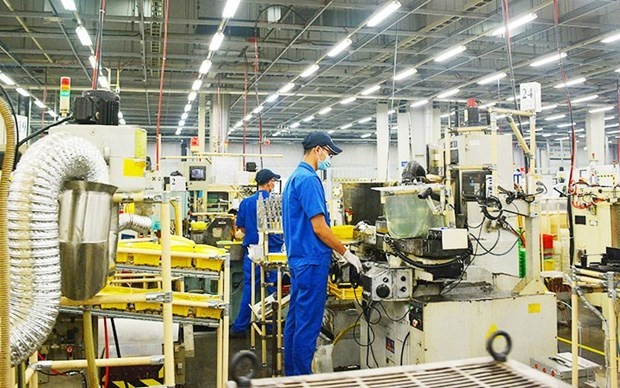 |
HCMC firms report difficulties amid rising industrial production. Illustrative image (Photo: VNA) |
According to the city’s Statistics Office, the city’s Index of Industrial Production (IPP) in April rose 3 percent over March and 8.1 percent year on year, resulting in an increase of 1.4 percent in the first four months of this year.
A year-on-year rise of 4.3 percent was seen in IPP of the four major industrial sectors in the January-April period, with 12.6 percent recorded in the pharmaceutical chemical industry, and 4.3 percent in mechanical engineering. Electronic production posted a decrease of 0.6 percent, while the IPP of the food and beverage sector was down 0.8 percent.
Nguyen Chanh Phuong, Vice President and General Secretary of the Handicraft and Wood Industry Association of Ho Chi Minh City (HAWA) said financial pressure is reducing the competitiveness of domestic firms when receiving large-scale orders.
Along with smoothing bottlenecks in capital flows, strengthened trade promotion is needed in the current situation, Phuong said.
Meanwhile, Hoang Trung Son, President of the Vietnam Pulp and Paper Association said that paper firms have operated their factory by 50-60 percent of their capacity, while inventory increase is forecasted to last until the end of 2023. Firms also face difficulties in input materials and refund activities, he added.
Nguyen Thi Kim Ngoc, Vice Director of the city Department of Industry and Trade, advised local firms to renovate their technologies and improve worker capacity as well as the infrastructure system to meet the requirements of the supply chain.
She said that the department is coordinating with other sectors, organizations and individuals to sketch out the industrial development orientations for the city until 2030 with a vision to 2050, aiming to restructure the industrial sector and promote science-technology research and innovation in the field.
At the same time, the city will continue to design support policies and favorable conditions for development research activities and human resources training for industry, thus turning science-technology and innovation into the key motivation for the fast and sustainable growth of industry, she said.
























